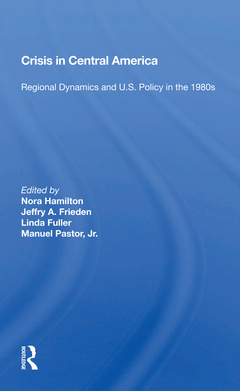Crisis In Central America Regional Dynamics And U.s. Policy In The 1980s
Coordonnateur : Hamilton Nora

Date de parution : 12-2020
14.6x22.9 cm
Disponible chez l'éditeur (délai d'approvisionnement : 14 jours).
Prix indicatif 50,12 €
Ajouter au panierDate de parution : 06-2019
15.2x22.9 cm
Disponible chez l'éditeur (délai d'approvisionnement : 14 jours).
Prix indicatif 160,25 €
Ajouter au panierThème de Crisis In Central America :
Mots-clés :
Young Men; demonstration elections; Internal Revenue Service; regional dynamics; Farabundo Marti Front; Central America; Punto Fijo; U.S.-Latin American relations; Military Junta; U.S; policy; Junta; Duarte Government; Central American Economies; Sandinista Popular Army; Central American Crisis; Nicaraguan Experiment; Central American Conflict; Central American Countries; Central American Refugees; Central American Economic Integration; War Powers Resolution; Low Intensity Warfare; Guatemalan Army; Reagan Doctrine; National Security Doctrine; Covert War; Salvadoran Armed Forces; Latin American Initiative; Non-durable Consumption Goods; Contra Aid



